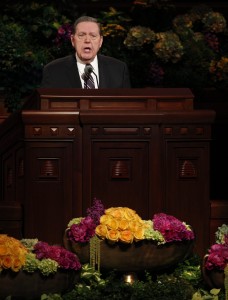
Elder Jeffrey R. Holland
Elder Jeffrey R. Holland began the Sunday afternoon session of the 183rd annual General Conference by sharing an account from the New Testament in which Jesus healed a young boy after his father cried out, “Lord, I believe; help thou mine unbelief.”
Holland said he wished to speak directly to the young people of the church–both those young in years of age and young in years of membership or years of faith. He emphasized the importance of how the man in this story first expressed his strength, then his shortcoming. He suggested that members of the Church do the same.
“In moments of fear or doubt or troubling times, hold to the ground you have already won, even if that ground is limited,” Holland said.
Holland explained it is okay to acknowledge one’s doubts. However, one must not belittle the faith he or she already has, but hold strong to it and help it to grow. “Be as candid about your questions as you need to be; life is full of them on one subject or another,” he said, but “don’t let those questions stand in the way of faith working its miracles.”
“When those moments come and issues surface the resolution of which is not immediately forthcoming,” he said, “hold fast to what you already know and stand strong until additional knowledge comes.”
Holland said the work of the Church is a work in process, “So don’t hyperventilate if from time to time issues arise that need to be examined, understood, and resolved,” he said. “They do and they will. In this Church what we know and will always know trump what we do not know.”
Holland closed by saying, “Hope on. Journey on. Honestly acknowledge your concerns but first fan the flame of your faith, because all things are possible to them that believe.”
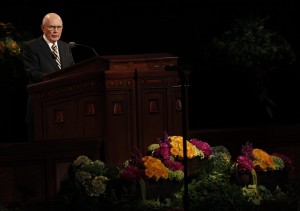
Elder Dallin H. Oaks
Elder Dallin H. Oaks followed Elder Holland. He said the members of the Church, like all Christians, study the life of Christ as reported in the gospels of the New Testament. He said he would like to invite everyone to consider how the restored Church and each of its members qualify as followers of Christ.
As Jesus taught that baptism is necessary to enter the Kingdom of God, members of the Church also do. As Jesus taught of repentance, members of the Church also do. As Jesus taught that “men ought to always pray,” members of the Church pray in worship services, in private and as families. As the Savior called twelve apostles to assist in His Church, giving them the keys of the priesthood, the Church follows this structure today. Peter said the followers of Jesus were to be a “peculiar people.” Similarly, Latter-day Saints today, Oaks said, understand that they should not be “of the world.”
“Most Christians give to the poor and needy, as Jesus taught,” Oaks said. “In following this teaching of our Savior, The Church of Jesus Christ of Latter-day Saints and its members excel.”
He described the Church’s contributions to charities, group service and personal service performed by Church members. He presented specifics about the global humanitarian efforts performed by the Church:
- Church relief effort following the 2011 Japanese earthquake and tsunami provided $13 million in cash and relief supplies.
- More than 31,000 Church-sponsored volunteers gave more than 600,000 hours of service.
- Hurricane Sandy relief included 300,000 hours of service and celan-up efforts by about 28,000 Church members.
- The Church provided 300,000 pounds of clothing and shoes for the refugees in the African nation of Chad.
- During the last quarter-century, the Church has assisted nearly 30 million people in 179 countries.
“Truly, the people called ‘Mormons’ know how to give to the poor and needy,” he said.

Elder Christoffel Golden Jr.
Elder Christoffel Golden Jr. of the Seventy, who is of French Protestant and Irish Catholic descent, began his talk following Elder Oaks by first acknowledging gratitude for the devotion of Christians throughout history. “Because of their faith and worship of God,” he said, “many of them sacrificed position, possessions and even their lives in defense of their God and their faith.”
Elder Golden said the quest for eternal life is to understand who God is so that those who wish to can someday return to live with him. He said the understanding of God’s nature for members of the Church has been shaped by Joseph Smith’s experience in the Sacred Grove. Smith’s experience revealed to us that God actually exists, that the Father and the Son are two separate distinct beings and that we are created in the image of God. Golden said this is consistent with other recorded events in the scriptures.
“The Father and the Son are distinctly separate beings,” he said. “But They are perfectly united and one in power and purpose.”
Golden said in order for anyone to become acquainted with the Father and the Son, they have been promised that the Holy Ghost will bear witness to them. He said the Holy Ghost can be felt by people of all religions, but that the full measure of the Holy Ghost can only come after a person has received “a broken heart,” a “contrite spirit,” the ordinance of baptism and the gift of the Holy Ghost by the laying on of hands through the power of the priesthood.
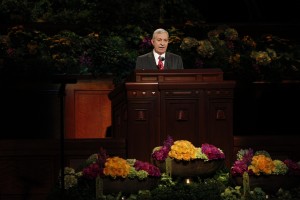
Elder Enrique R. Falabella
Elder Enrique R. Falabella of the Seventy followed Elder Golden. He shared various experiences with his wife that he felt illustrated important life lessons. “Both happy and sad, we learn from them all,” he said.
One of the six individual lessons he shared included an anecdote about his expanding his testimony of the gospel with his wife. He said when he returned from his mission he thought he knew everything he needed to know about the gospel, but she proved him wrong.
“After we married I came to a serious realization as I learned a great lesson from her: I may have tried to teach her the gospel, but she taught me how to live it.”
“These and many other lessons are learned in a home,” Falabella said. “The place that can become a piece of heaven here on earth.”
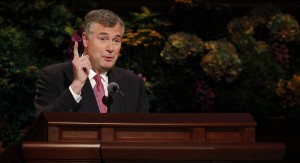
Elder Erich W. Kopischke
Elder Erich W. Kopischke followed. He said, “The feeling of being accepted by someone we love is a basic human need. … Those who cannot find acceptance from desirable sources often seek it elsewhere.”
He said those who seek acceptance elsewhere may attach themselves to people who are not interested in their wellbeing. They may also cling to a superficial search for status. He said even people in the Church are not free from this type of search for acceptance.
“Seeking acceptance from the wrong sources or for incorrect reasons puts us on a dangerous path,” he said. “One that is likely to lead us astray and even to destruction.”
Kopischke said the ultimate source of empowerment and lasting acceptance is through Heavenly Father and Jesus Christ. “The know us. They love us,” he said. “They do not accept us because of our title or position. They do not look at our status. They look into our hearts. They accept us for who we are and what we are striving to become.”
“Seeking and receiving the acceptance of the Lord will lead to the knowledge that we are chosen and blessed by him,” Kopischke said. “We will gain increased confidence that he will lead us and direct us for good. His tender mercies will become evident in our hearts, in our lies, and in our families.”
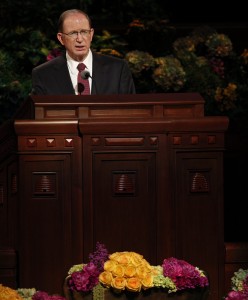
Elder Bruce D. Porter
Elder Bruce D. Porter then spoke. He began his talk by drawing parallels between the Last Supper and the world of today. At the Last Supper, the darkest hours in the history of the world were imminent, yet Jesus said to his disciples, “In the world ye shall have tribulation, but be of good cheer.”
Today, Porter said, tribulation and difficult times may lie ahead, yet like the apostles had, there is reason to rejoice and be of good cheer. This is because the dispensation of the fulness of the gospel is on earth and the return of Christ is at hand. He said if members of the Church remain faithful to and rely on the Church, they will be able to face the difficult conditions of the world and find happiness.
“Though conditions in the world may become very vexing at times, faithful Latter-day Saints will find sanctuary in the stakes of Zion,” he said. “Every one of us, and our families, can be armed with the power of God as a defense if we will but remain true to the church of Jesus Christ of Latter-day Saints and let the Spirit be our guide.”
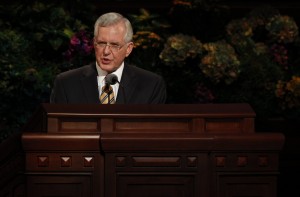
Elder D. Todd Christofferson
Elder D. Todd Christofferson offered the last talk before President Monson’s final remarks. Speaking on redemption, Christofferson said there are two aspects to the Savior’s Atonement. The first is to atone for Adam’s transgression and the direct effects of his fall–physical death and spiritual death. The second aspect is to atone for the indirect consequences of the fall–our own sins.
However, Christofferson said, because God’s children are accountable and they make their own choices, redemption from our sins is conditional upon their willingness to confess their sin and abandon it, turning to a more godly life. Christofferson shared the story from Victor Hugo’s novel Les Miserables, in which the main character, Jean Valjean, steals from a Bishop Bienvenu. Like Christ does for everyone, the bishop forgave Veljean, but asked him to turn his life around and commit himself to doing good. Valjean did just that.
The atonement additionally compensates repenters for the suffering we “innocently endure,” Christofferson said, as Christ atoned for not only their sins, but also their pain.
The greatest service that can be provided to others in this life is to bring them to Christ so that they can experience his redemption, which will bring them “peace and joy now, and immortality and eternal life in the world to come,” Christofferson said.
Redemptive work also extends to those beyond the grave. “Even those who died in bondage to sin can be freed,” he said.
Redemptive work additionally means helping people with their problems. “It means befriending the poor and the weak, alleviating suffering, righting wrongs, defending truth, strengthening the rising generation, and achieving security and happiness at home,” Christofferson said. “Much of our redemptive work on earth is to help others grow and achieve their just hopes and aspirations.”
Christofferson said as followers of Jesus Christ, members of the Church are a community of Saints organized to help redeem the needs of their fellow Saints as well as others across the globe. He added to Elder Oaks’ description of the Church’s humanitarian efforts. He shared specifics about global Church efforts in the past year:
- 899,000 people in 36 countries now have clean water.
- 70,000 people in 57 countries have wheelchairs.
- 75,000 people in 25 countries have improved vision.
- People in 52 countries received aid following natural disasters.
- The Church helped administer immunizations to 8 million children.
- The Church helped Syrians in refugee camps in Turkey, Lebanon and Jordan with “the necessities of life.”
- Members of the Church in need received over $500 million in welfare goods and services in 2012.
Christofferson said these numbers, though great, do not take into account individual acts of kindness and support from members of the Church.
“As disciples of Jesus Christ, we ought to do all we can to redeem others from suffering and burdens,” Chrisfotterson said. “Even so, our greatest redemptive service will be to lead them to Christ.”
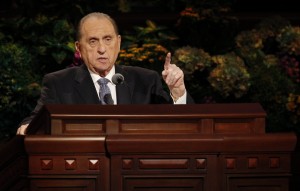
President Thomas S. Monson
President Thomas S. Monson concluded the last session of General Conference. He said he admonishes members of the Church to be good citizens of the nations in which they live and good neighbors in their communities, reaching out to those of other faiths as well as their own.
“May we be tolerant of, as well as kind and loving to those who do not share our beliefs and our standards,” he said.
Monson said he prays that Church members will be aware of the needs of those around them. “There are some, particularly among the young, who are tragically involved in drugs, immorality, pornography and so on,” he said. “There are those who are lonely, including widows and widowers, who long for the company and concern of others. May we ever be ready to extend to them a helping hand and a loving heart.”
He closed the meeting with his testimony that God lives, that he hears the prayers of humble hearts and that he speaks to everyone.
“I invoke the blessings of heaven upon each of you,” Monson said. “May your homes be filled with peace, harmony, courtesy and love. My they be filled with the Spirit of the Lord. May you nurture and nourish your testimonies of the gospel, that they will be a protection to you against the buffetings of Satan.”




